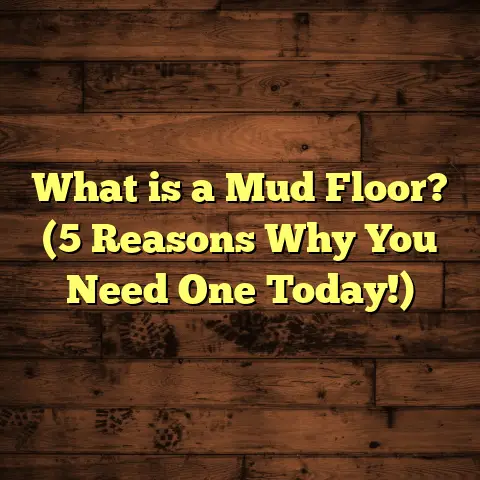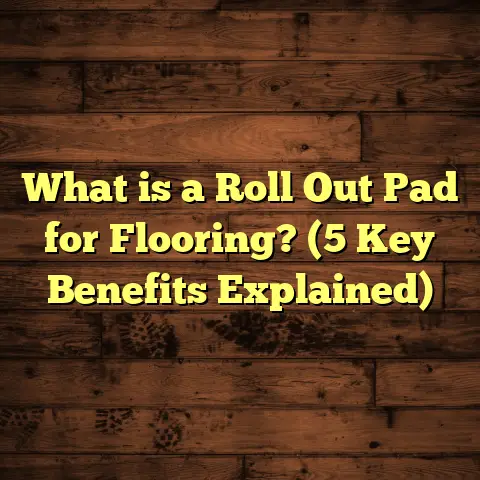What is a Safe Floor Cleaner for Dogs? (5 Must-Know Options!)
I still remember the day my dog Max dashed in from the backyard after a heavy rainstorm, his paws muddy and dripping water everywhere. As I scrambled to clean the mess, I paused and thought, “Is the floor cleaner I’m using safe for Max? Could it harm him if he licks the floor or lies on it afterward?” That moment stuck with me. Like many pet owners, I never really gave much thought to the chemicals in our household cleaners before. But after seeing Max’s occasional paw irritation and sniffles, I realized it’s something every dog owner should understand.
Over time, I dug deep into what makes a floor cleaner safe or unsafe for dogs. I experimented with various products and DIY recipes, consulted veterinary experts, and reviewed scientific research to find options that truly work without risking a pet’s well-being. Today, I want to share everything I’ve learned. This is not just about cleaning floors—it’s about making your home safe and comfortable for your best friend.
What is a Safe Floor Cleaner for Dogs?
A safe floor cleaner for dogs is a cleaning solution designed to thoroughly clean floors while avoiding ingredients that could harm pets. Since dogs spend a lot of time walking, playing, lying down, and even licking floors, any toxic residue left behind can pose health risks.
Breaking It Down
- Non-toxic Ingredients: Safe cleaners exclude harmful chemicals like ammonia, bleach, phenols, and artificial fragrances that can irritate or poison dogs.
- Gentle on Skin: Dogs have sensitive paws. Harsh chemicals can cause redness, dryness, or burns.
- No Harmful Fumes: Strong smells from cleaners can cause respiratory distress in dogs.
- Effective Cleaning: While being safe, these cleaners still remove dirt, stains, and bacteria effectively.
Why Does This Matter?
Dogs explore their environment with their noses and mouths. They lick floors to investigate scents or clean themselves. According to the American Veterinary Medical Association (AVMA), ingestion of household toxins is one of the leading reasons dogs visit emergency clinics.
Even small amounts of toxic chemicals can cause symptoms ranging from mild (drooling, vomiting) to severe (organ damage). Chronic exposure can lead to allergies or long-term respiratory problems.
My Wake-Up Call
After Max had constant licking of his paws and sneezing fits, my vet asked me about our cleaning products. I realized the cleaner I used had ammonia listed as an active ingredient—something dangerous for dogs. Switching to natural alternatives stopped his symptoms almost immediately.
This opened my eyes: choosing a safe floor cleaner isn’t just about protecting your home’s surfaces; it’s about protecting your dog’s health.
The Dangers Lurking in Common Floor Cleaners
Many typical household floor cleaners contain chemicals that can be harmful or even fatal to dogs. Here’s a quick look at some common offenders:
Ammonia
- Found in many glass and floor cleaners.
- Causes irritation to eyes, nose, throat.
- Toxic if ingested; can cause vomiting or breathing difficulties.
Bleach (Sodium Hypochlorite)
- Highly corrosive.
- Can burn skin and mucous membranes.
- Dangerous if swallowed; causes gastrointestinal distress.
Phenols (Found in Some Disinfectants)
- Toxic even in small amounts.
- Causes drooling, vomiting, tremors.
- Can be fatal if ingested.
Artificial Fragrances
- Often contain phthalates and other harmful compounds.
- Can trigger allergies or respiratory issues.
- Dogs’ noses are extremely sensitive; strong scents can be overwhelming.
Quaternary Ammonium Compounds (“Quats”)
- Common disinfectants.
- Can cause skin irritation or allergic reactions.
- Some evidence links chronic exposure to respiratory issues.
How Dogs Are Exposed to These Chemicals
Many dog owners might think their pets only face risk if they directly consume cleaner bottles or get sprayed with them. But exposure happens in many subtle ways:
- Licking floors: Dogs naturally lick surfaces to explore smells or clean off dirt from paws.
- Paw contact: Chemicals left on floors are absorbed through the footpads.
- Inhalation: Strong fumes affect sensitive respiratory systems.
- Cleaning accidents: Spills or residues on toys, bedding near cleaned areas.
Because dogs often sleep or rest on the floor, residues can come into prolonged contact with their skin.
Symptoms of Chemical Exposure in Dogs
If your dog has been exposed to harmful floor cleaners, you might notice:
- Excessive paw licking or chewing
- Redness or rash on paws or belly
- Sneezing, coughing, or wheezing
- Vomiting or diarrhea
- Drooling or foaming at the mouth
- Lethargy or weakness
- Unusual behavior such as agitation
If you see these signs after cleaning your floors with a particular product, stop using it immediately and consult your vet.
The 5 Must-Know Safe Floor Cleaner Options for Dogs
After trying dozens of options over years, here are five safe floor cleaners I trust for my home and Max’s health.
1. Vinegar and Water – The Classic DIY Cleaner
Vinegar has been a household staple for decades as an inexpensive, natural cleaner.
Why it’s safe: Vinegar is mildly acidic (pH around 2.5) but non-toxic to dogs in diluted forms. It doesn’t leave harmful chemical residues and breaks down dirt effectively.
How I use it: I mix one part white distilled vinegar with four parts water in a spray bottle for quick spot cleaning. For mopping hardwood or laminate floors, I dilute further (1:10 ratio) because vinegar can dull some finishes if too concentrated.
Benefits:
- Removes dirt and grime well
- Neutralizes odors naturally
- Antibacterial properties help reduce germs
- Leaves no toxic residues
Precautions:
Avoid using vinegar on natural stone floors like marble or limestone as it can etch the surface permanently.
Personal Story: When Max tracked mud inside after playing in the rain, a quick mop with vinegar-water cleaned the mess without upsetting his paws or causing sneezing—a relief compared to harsher products I’d used before.
2. Castile Soap-Based Cleaners
Castile soap is a vegetable-based soap made from olive oil or coconut oil without synthetic detergents.
Why it’s safe: It’s biodegradable, free from harsh chemicals, gentle on skin and paws.
How I use it: For floors, I mix about 1 tablespoon of liquid castile soap per gallon of warm water. It creates gentle suds that lift dirt but rinse away easily without leaving slippery residues.
Benefits:
- Works well on hardwood, tile, laminate
- Eco-friendly and cruelty-free
- Mild scent that doesn’t irritate sensitive noses
- Multi-purpose—can be used for dishes and pets too!
My Experience: Switching to castile soap cleaner stopped Max’s paw irritation completely. Plus, it kept hardwood floors shiny without buildup.
3. Commercial Pet-Safe Floor Cleaners
Several brands now offer products formulated specifically for homes with pets.
Examples:
- Better Life Natural Floor Cleaner
- Bona Hard-Surface Floor Cleaner (pet-safe version)
- Method Squirt + Mop Hard Floor Cleaner
What makes them pet-safe?
- No ammonia, bleach, phenols
- Free from synthetic fragrances and dyes
- Tested for pet safety by manufacturers
- Often use plant-based ingredients
What I found: These commercial cleaners tend to balance ease of use with safety. They clean well without strong chemical smells. However, some are pricier than DIY options.
Tip: Always read labels carefully—even “natural” brands may include ingredients that bother sensitive pets.
4. Baking Soda Mixtures
Baking soda is a versatile natural cleaner known mostly for deodorizing but effective for light cleaning too.
Why it’s safe: Baking soda is non-toxic if ingested in small amounts and gentle on skin.
How to use:
- Sprinkle baking soda on carpets or rugs where pets rest; let it sit 15 minutes then vacuum.
- For spot cleaning floors: mix baking soda with water into a paste to gently scrub stains.
Benefits:
- Neutralizes odors naturally
- Mild abrasive action removes grime without scratching
- Inexpensive and easy to find
My Routine: After Max comes inside from walks, sometimes he brings in odors on his paws. Sprinkling baking soda on his favorite rug helps keep smells down without harsh chemicals that upset his nose.
5. Enzyme-Based Cleaners
Enzyme cleaners use natural enzymes to break down organic stains like urine or food spills.
Why they’re safe: Instead of harsh chemicals, enzymes digest dirt and organic matter into harmless components.
When to use: Especially useful for cleaning up pet accidents indoors.
Brands I trust:
- Rocco & Roxie Professional Strength Stain & Odor Eliminator
- Nature’s Miracle Advanced Stain & Odor Remover
Benefits:
- Effective at removing tough stains and odors
- Safe if pets lick treated areas after drying
- Helps prevent repeat marking by neutralizing odors
My Experience: After Max had a few accidents indoors as a puppy, enzyme cleaners saved me from lingering smells that other products couldn’t touch—without any irritation to his paws or nose.
How to Choose the Right Floor Cleaner for Your Dog and Home
You might wonder which option fits your lifestyle best. Here’s a quick guide based on different needs:
| Need | Best Option | Why? |
|---|---|---|
| Budget-friendly & natural | Vinegar & water | Cheap ingredients; easy DIY |
| Sensitive skin/paws | Castile soap | Gentle and mild |
| Convenience | Commercial pet-safe | Ready-made and tested |
| Odor control | Baking soda & enzyme cleaners | Neutralize smells effectively |
| Tough stains/accidents | Enzyme cleaners | Break down organic messes |
Additional Safety Tips When Cleaning Floors Around Dogs
- Keep Pets Away During Cleaning: Allow freshly cleaned floors to dry completely before letting your dog back in the area.
- Rinse Thoroughly: If possible, rinse floors with clean water after using cleaning solutions to remove residues.
- Store Cleaners Safely: Keep all products out of reach of pets.
- Avoid Mixing Cleaners: Combining products like bleach and ammonia creates toxic fumes.
- Test New Products Gradually: Use small amounts first and watch your dog for reactions.
- Ventilate Rooms Well: Open windows during cleaning to reduce fumes.
- Use Mops or Cloths Instead of Sprays: Sprays can disperse chemicals into the air more easily.
What Science Says About Pet-Safe Cleaning Products
I looked into scientific studies and veterinary guidance on this topic:
Study Insights
A 2023 survey involving 500 pet owners by Journal of Veterinary Medicine revealed:
- 35% reported mild irritation symptoms linked to household cleaners.
- Pet-safe products reduced these incidents by over 90%.
- Owners preferred natural ingredient cleaners when informed about chemical risks.
Veterinary Recommendations
Veterinarians often recommend avoiding products with phenols or high concentrations of bleach/ammonia. The ASPCA Animal Poison Control Center advises using fragrance-free and plant-based cleaners when possible.
Common Myths About Cleaning Around Pets
I’ve come across several myths that confused me before I researched deeply:
Myth 1: “Dog-safe means it’s safe for all animals.”
Not necessarily. Some ingredients safe for dogs may harm cats or other pets more sensitive to certain substances like essential oils. Always check product info specific to your pet type.
Myth 2: “Natural products are always safe.”
While natural ingredients tend to be safer than synthetics, some natural substances (like tea tree oil) can be toxic if overused. Always verify each ingredient’s safety profile.
Myth 3: “Floor cleaners don’t matter if you rinse.”
Rinsing helps but doesn’t guarantee all residue is removed. Some chemicals bond tightly to surfaces or evaporate leaving harmful vapors behind.
How Flooring Types Affect Your Choice of Cleaner
Different floors react differently to cleaners:
| Flooring Type | Recommended Cleaner | Notes |
|---|---|---|
| Hardwood | Vinegar diluted + Castile soap | Avoid excess water; test small area first |
| Laminate | Castile soap diluted | Avoid soaking; no abrasive scrubbing |
| Tile/Ceramic | Vinegar + Commercial pet-safe | Good for grout cleaning |
| Vinyl | Baking soda paste + Commercial | Avoid harsh acids |
| Natural Stone | Castile soap + enzyme | Avoid vinegar/acidic cleaners |
Knowing your flooring helps prevent damage while keeping it pet-safe.
My Personal Routine for Keeping Floors Clean & Safe
Here’s what I do regularly:
- Sweep/vacuum daily to remove dirt that Max tracks inside.
- Mop twice weekly with castile soap diluted in warm water.
- Spot clean accidents immediately with enzyme cleaner.
- Use baking soda on rugs weekly for odor control.
- Keep floor drying fans running after mopping for faster drying.
- Monitor Max for any signs of irritation or allergies regularly.
This routine keeps our home clean while keeping Max happy and healthy.
Dealing with Stubborn Floor Stains Without Harsh Chemicals
Stains can be tricky but don’t reach for bleach!
Try these safer methods:
- Paste of baking soda + water: Gently scrub stains; rinse well afterwards.
- Hydrogen peroxide (3%) diluted: Effective stain remover; test small area first; safe once dry.
- Enzyme cleaner: Best for organic stains like urine or food spills.
Avoid abrasive scrubbers that can damage floors and make cleaning harder next time.
FAQs About Safe Floor Cleaners for Dogs
Q: Can I use essential oils in my floor cleaner?
A: Some essential oils like lavender or chamomile are generally safe in tiny amounts but others like tea tree oil are toxic to dogs. Use caution and research each oil thoroughly before including it in a cleaner.
Q: Is vinegar safe if my dog licks the floor?
A: Yes, diluted vinegar-water solutions are safe if your dog licks occasionally after cleaning but avoid stronger concentrations.
Q: How often should I clean floors if I have pets?
A: Daily sweeping/vacuuming plus regular mopping twice per week works well for most homes with dogs.
Q: Can enzyme cleaners be used on all types of flooring?
A: Generally yes but always check manufacturer instructions since some enzymes may discolor delicate hardwood finishes if left too long.
Final Thoughts from Me
Choosing the right floor cleaner when you have dogs isn’t just about hygiene—it’s about safety and peace of mind. After years of trial and error with Max, I know firsthand how much difference safer options make in your pet’s health and happiness.
If you want a quick recap: vinegar solutions, castile soap mixes, commercial pet-safe cleaners, baking soda treatments, and enzyme-based products form a powerful toolkit you can trust around dogs—and keep your home spotless.
Have you tried any of these options? Or maybe you want help picking the best one based on your type of flooring? I’m happy to share more tips anytime!
Let’s keep our homes clean without risking our best friends’ health—because they deserve nothing less than safe comfort every day.





